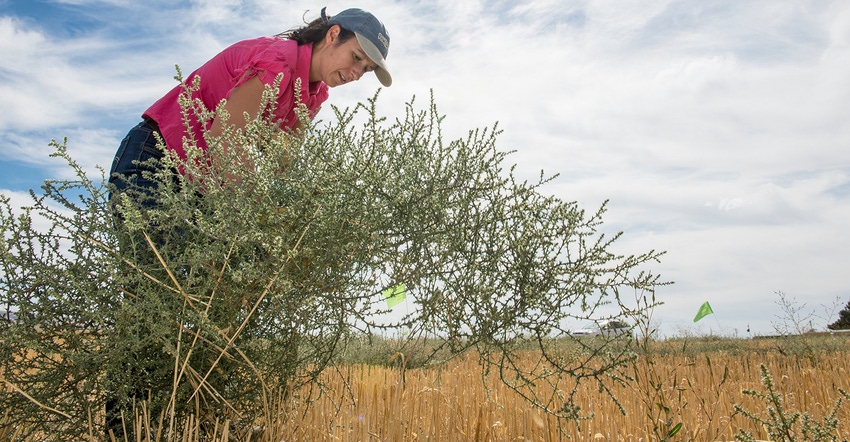March 20, 2017

For nearly two years, there was a fear bubbling around the weed science department at Oregon State University. Researchers were concerned they had some populations of Russian thistle in the northeastern part of the state that had developed resistance to glyphosate — a popular and widely used herbicide.
Their fears came to fruition as they announced recently that resistance to the herbicide has been confirmed in this population. Russian thistle is an invasive species; and while it can be grazed by cattle and its seeds can be popular for birds, it spreads quickly and can cause trouble in fallow wheat land.
The finding was published online in the journal Pest Management Science, and shows that in the resistant populations, plant mortality was less than 30% three weeks after treatment with normal rates of glyphosate. And the research showed the plants could stand up to a three-fold dose of the herbicide, and some would still survive.
This is a concern because Russian thistle, when it matures, often breaks free and tumbles across the open ground in the Northwest. Each plant can have up to 50,000 seeds; and with its tumbleweed action, these resistant seeds could cover a lot of territory.
In announcing the finding, Judit Barroso, an assistant professor and weed scientist at OSU, said, "This species is a serious threat to the sustainability of the wheat-summer fallow cropping systems of the inland Pacific Northwest. It is very often the predominant broadleaved weed in many of the fields, and farmers rely extensively on glyphosate to control it."
Another "tumbleweed" in the Western Corn Belt — kochia — has also been found to be resistant to glyphosate. Its resistance was discovered in Kansas a decade ago and has since spread into Nebraska.
OSU reported that Russian thistle causes serious crop production problems in dryland small-grain-producing areas, costing farmers more than $50 million annually in control measures. Farmers in the arid region of northeastern Oregon rely on repeated applications of herbicides such as glyphosate for control.
Barroso is working with growers to delay the spread of resistance from this population. Tactics include rotating herbicides and using other weed control practices. "There needs to be an immediate transition to a more diversified approach for control of this troublesome weed species," she said.
A little background
There are a range of reasons for poor glyphosate performance. OSU pointed to poor postharvest conditions like dust and water stress, or generally poor growing conditions during application. All can affect glyphosate effectiveness. However, reduced control may also be the result of the evolution of glyphosate resistance in the species, too, Barroso said.
Glyphosate is a lower-cost alternative to other herbicides available, which has encouraged repeat applications — and that can raise the likelihood of resistance appearing.
In fall 2015, farmers in northeast Oregon reported problems controlling the weed with glyphosate. In February 2016, OSU researchers made random selections of plants from 10 Russian thistle populations in fallow fields in Umatilla, Morrow and Sherman counties.
Lab testing of those samples showed that three from Morrow County were glyphosate-resistant. Barroso said those three populations were likely treated with glyphosate more often than the plants that were susceptible to the herbicide.
Russian thistle breaks off at the stem when it dies and moves with the wind. A popular feature in films of the Old West, that lonely tumbling tumbleweed today is probably carrying glyphosate-resistant weed seed across a wide area. This may allow glyphosate resistance to spread quickly.
Source: Oregon State University
You May Also Like




